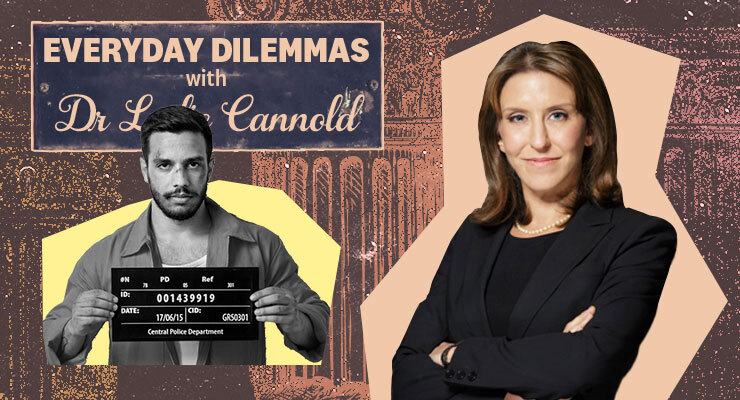
In Everyday Dilemmas, Dr Leslie Cannold uses her ethical training to help solve your problems. Send your questions to letters@crikey.com.au with “Dear Leslie” in the subject line. She might even reply…
Dear Leslie,
My husband is in jail. Not for life but for yonks. I feel bad, but I want to leave him. I know he’ll be devastated — he says five years isn’t that long — but I didn’t sign up for this. Am I a terrible person?
Antsy in the NT
Dear Antsy,
That’s a tough position you’re in.
No, I don’t think you’re a terrible person, but what I think doesn’t really matter. I don’t have to live with your decision for the rest of your life.
You’re already doing the right thing by your spouse and yourself by not shooting from the hip, instead reflecting on the choice you have to make and how your decision will affect both of you.
You seem focused on the short-term costs of “waiting for him” and the impact these will have on the plans you had for your married life. Perhaps you were looking forward to nights on the couch watching TV, or going out together or starting a family, and his incarceration puts a wrench in that. This happens whenever the plans we have for our life don’t eventuate. Whether its infertility destroying an imagined future as a parent, or a pile of rejection slips putting paid to our plans for a writing career, there are always two ways forward in the face of such roadblocks: keep fighting for the future you imagined — by pursuing IVF or self-publishing — or amend your plans.
The fact that your inclination is to leave suggests that the future you’ve imagined doesn’t so much require him, only the presence of a husband. That it’s more painful for you to abandon your couch-sitting or family-having plans than to contemplate doing these things with a man other than him says something worth noticing about your feelings for your spouse. Why? Because true love is person-specific. And if this isn’t true love, the chances of it surviving five years of separation are slim, so perhaps making the break now rather than dragging it out is better for everyone, including him.
I wish you the best, whatever you decide.
Leslie
Dear Leslie,
I am in the run-up to retirement after a long and successful career. I’d like to give more of my salary to the young women at the office who don’t get paid fairly. But I have three daughters still at home and wonder if my main job is to keep making sure they have what they can’t otherwise afford. Cars, holidays, etc.
Baffled Feminist
Dear Baffled,
What a wonderful dilemma to have! And aren’t the women in your life lucky to have you concerned about their welfare in a society that refuses to fix the gender pay gap — in which Australian women earn on average $261.50 a week less than men — so their need for a monetary top-up goes away.
Philosophy students often debate a version of your dilemma which involves a burning building with two trapped occupants — the future discoverer of a cure for cancer, and your daughter — and you are able to save only one. Most people opt for their daughter, because they tend to believe their moral obligations to family and friends override those to strangers, even when choosing strangers would benefit many more people.
I wonder who you would save? Not because either answer is right — in Western moral philosophy both rescue choices are permissible — but because it might give you some feel for your own moral leanings, which I’d advise you to follow.
If you’re still not sure what to do, why not ask your daughters what they think of your proposal to sacrifice some of your salary to better the lot of your female co-workers? Their answers might surprise you and, if they don’t, that could help you decide, too.
I wish you the best of luck, and please let me know what happens!
Leslie
Send your dilemmas to letters@crikey.com.au with “Dear Leslie” in the subject line and you could get a reply from Dr Cannold in this column. We reserve the right to edit letters for length and clarity.








This Thursday’s edition has been a top read of important news events affecting the lives of a great many of Australia’s people.
All at Crikey.com (not forgetting Peter, who happens to be the boss.) Top job to each and all. William.
Regarding the letter to Leslie “Dear Leslie, my husband is in jail etc” ,
I have been doing some looking at prisoner stats.
Basically, 5 years is a VERY LONG sentence in the NT.
For comparison, the median sentence is 122 days. [1]
I acknowledge I have no professional training or experience in the criminal justice area.
However, it takes only a cursory knowledge of how sentencing works to know that a sentence that MUCH longer than median, is likely to be the result of REPEAT, VIOLENT OFFENDING.
Which in turn must make this person a very poor prospect.
In principle, I believe rehabilitation is possible for anyone. However (i) this man has is likely to have already been given at least 1 chance by society
(ii) Australia is not good at rehabilitating prisoners.
(iii) The writer needs to think of her own welfare.
Here is another factor which may be influencing the writer’s thinking:
“At 30 June 2018, 84% of adult prisoners in the NT were Aboriginal, despite Aboriginal adults accounting for 25.9% of the NT’s adult population.1” [2]
So if all we know is prisoner, NT, male, he is likely to be a member of this oppressed population. I’m guessing the very long sentence makes it even more likely that the male is Aboriginal.
So I’m guessing there may be some issues of group solidarity involved. Maybe the writer feels some sense of obligation. Maybe there is pressure from within the group. As I said, only guesses, but I believe plausible. If that is the case, and my advice was asked, then my advice would be that writer needs to think of her own welfare.
[1] https://justice.nt.gov.au/__data/assets/pdf_file/0004/599107/2016-17-ntcs-annual-statistics.pdf
[2] https://justice.nt.gov.au/__data/assets/pdf_file/0010/728164/aim1-Reduce-reoffending-and-imprisonment.pdf